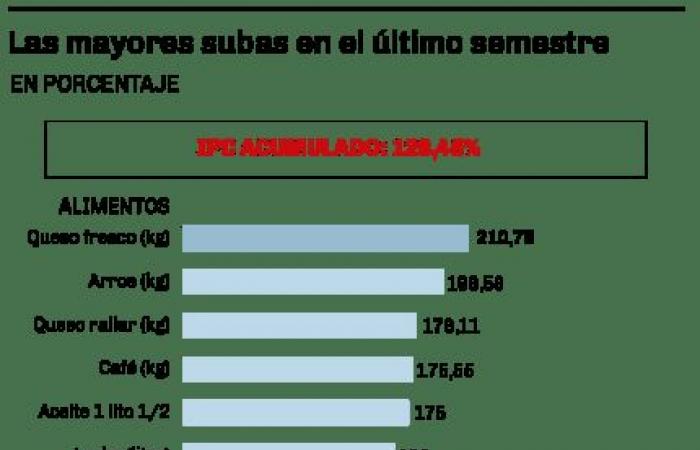After the shocking inflation data from last December: 25.2% in the country and 33.51% in Río Negro; five months of gradual decline were recordedwith increases of 4.2% at the country level and 4.67% in the province, last May.
However, salary increases continue to run from behindalthough official national data (see separate) give almost a virtual tie between inflation and salaries – for the first quarter of the year – difficult to sustain with a review between different union actors and daily life data collected by the workers themselves.
During the six months of management headed by President Javier Milei Accumulated inflation is around 100% and salaries are the big losers.
In Río Negro, with the joint negotiations in full discussion for the June-July two-month period, The Government insists on marking increases above the inflation rate and the state unions buckle in rejection as “insufficient.”
For the administration of Alberto Weretlneck in the period between December 2023 and last May, the increases for workers covered by Law No. 1844 they range between 99% and 104%, between 91% and 116% for those covered by Law No. 1904, up to 92% for penitentiary workers and between 83% and 107% for police personnel. While the increase would be up to 156% in the case of teachers.
In ATE, UPCN, Unter, Sitrajur and Asspur there are different readings. The maintenance of the discussion is valued, but the major questions fall on the application of “non-remunerative” or “rewardable” fixed sums and Sitrajur, for example, estimates that the salary loss in recent months reached 16%.
The situation is similar for the national state companies, which received increases of 2% for April and 7% for May, with a cumulative 9.1% for the two-month period.
That offer, which closes the annual parity (from June 2023 to May 2024, according to agreement 214/06), was accepted by UPCN, which is why it was settled with May salaries, but rejected by ATE because it estimated a “fall in real wages of 22.4%” in that period.
The municipal authorities of the provincial capital are in full negotiation, which could have a new agreement on Tuesday. After a 25% salary increase last February, the municipality bowed to provincial decisions and it started with offers of fixed sums for March and April and is now going down the same path.
From the municipal unions they ask that no agent be paid “a gross salary of less than 750,000 pesos.”
SMEs and workers adapt because the fight is between both of them. “We preserve sources of work so that they do not fall out of the system.”
Bruno Cabrera, general secretary of the Association of Commercial Employees.
In the private sphere “There is stagnation in the worker’s economic level and purchasing power is lost” said BrunoCabrera, general secretary of the Commercial Employees Association.
He explained that the joint venture was closed until May “but the 2024 discussion did not begin” and there are only bimonthly reviews.
He said that currently the basic initial salary for a teacher or salesman is 760,000 pesos and recalled that in the area “12% more is paid as agreed from 2006.” Even so, many workers are looking for another source of money to “be able to pay for themselves.”
In addition to the salary complication, the sector suffered the loss of 30 jobs, especially in large-scale businesses.
“SMEs do not lay off because they have people with a lot of seniority and they could not afford it” for that reason, he said, “They endure and the worker adapts, because the fight is between both of them.”
Cabrera pointed out that the union seeks to “preserve job sources.” so that no one “falls out of the system” and added that informality is being “regularized” through “joint work” with the Chamber of Commerce and the minimarket sector.
The situation is different, for example, for banks; who abandoned collective negotiations in the medium term and since January Monthly percentage increases are agreed upon, which are then adjusted for inflation through the “trigger clause.”
This mechanism allows them the reinsurance of equating salary increases with the monthly inflation index.
For Indec, inflation and salaries are almost at par in the first quarter
According to data from the National Institute of Statistics and Censuses (Indec), the Consumer Price and Salary indices register almost parity in the first quarter of the year.
The official data on salary developments are only complete until last March and indicate that in that month The average increase was 10.3% with an interannual variation of 200.8% and 45.5% for the first three months of 2024.
The average salary evolution is explained with an increase of 11% in the public sector, 10% in the registered private sector and 9.7% among unregistered or informal workers.
In that same month, inflation was 11% with an increase between April 2023 and March 2024 of 287.9% and 51.6% for the first quarter of this year. According to these official data, the difference is established at 6 percentage points.
In six months the cost of living doubled
The first semester of management of the La Libertad Avanza government closed with an accumulated inflation of almost 100%, The year-on-year increase rose to 287.9% and if the first quarter of 2024 is taken, it is 51.6%, according to the National Institute of Statistics and Censuses (Indec).
In RíoNegro those figures are d128.45% in the last six months300.72% between June 2023 and May 2024, and 49.23% in the first quarter of this year, according to data from the Directorate of Statistics and Censuses.
Based on the Rio Negro survey, it is possible to reconstruct the path of the prices of the different products from December 2023 and Food, services, fuel, transportation, cleaning supplies and medicines registered increases well above the measurement.
Among the foods the kilo of fresh cheese rose 201.75%the package of rice 198.58%, the kilo of cheese to grate 176.11%, the coffee 175.55% and the oil 175%.
It was also shot the liter of milk with a rise of 160%, wheat flour 158.6%, lentils 136.66%, a kilo of bread 136.25%, butter 130.07% and noodles 124.54%, almost at the same level as inflation.
Below the accumulated index were the grass with 100.43%; chicken 104.81%; the dozen eggs 94.87%, the roast 81.87%, the buttock 81.56%, women’s clothing 80% and men’s 63.03%, and sugar 22.47%.
Among the services, electricity increased by 200.42% and gas 330.83%; fuel rose 181.51% and public transport 250%.
Among the cleaning products, soap, in bread, stands out, with 205.08% and bleach 176.34; while analgesics and fever reducers rose 150.47%.
In entertainment, the methodology was repeated with 100% in cinema and 109.19% in cable TV.









